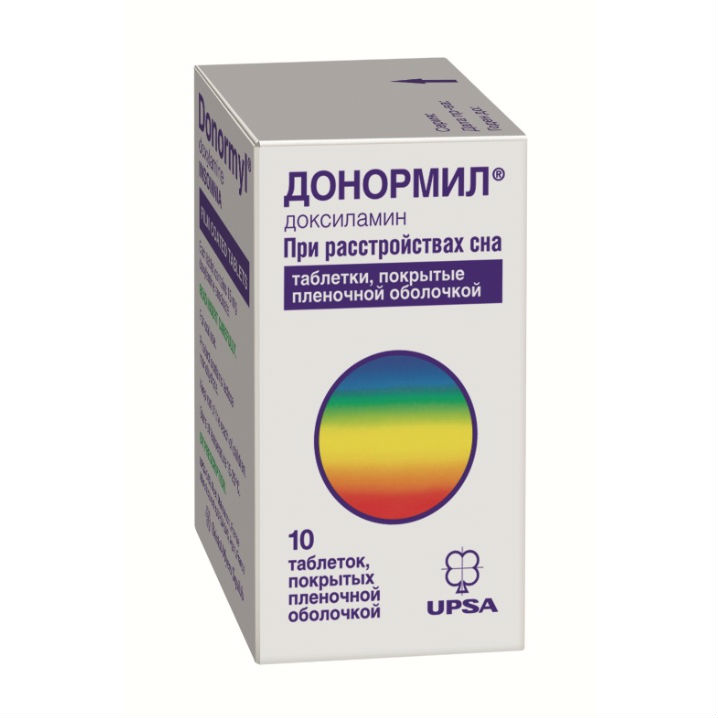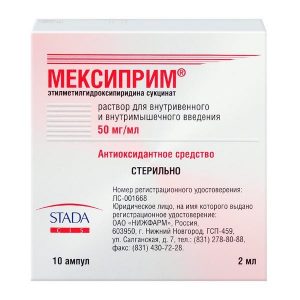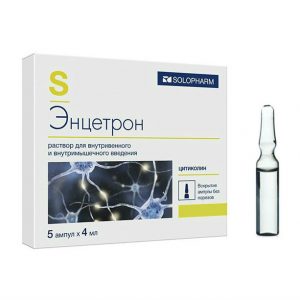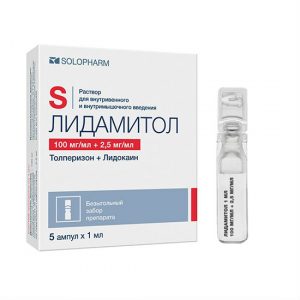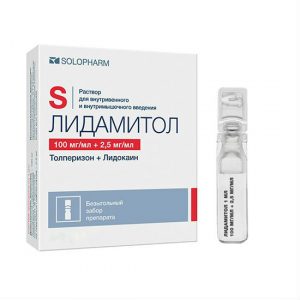Description
Release form
Tablets
Pharmacological action
Blocker of H1-histamine receptors from the group of ethanolamines.
The drug has hypnotic, sedative and M-anticholinergic effects. Reduces the time of falling asleep, increases the duration and quality of sleep, while not changing the phase of sleep. Duration of action is 6-8 hours.
Pharmacokinetics
Absorption – high, metabolized in the liver. It penetrates well through the histohematological barriers (including the blood-brain barrier). It is excreted by 60% by the kidneys unchanged, partly through the digestive tract.
Indications
Sleep disturbances, insomnia.
Contraindications
– Hypersensitivity to doxylamine and other components of the drug, or to other antihistamines
– angle-closure glaucoma or a family history of angle-closure glaucoma
– diseases of the urethra and prostate gland, accompanied by impaired urine outflow
– congenital galactosemia, glucose-galactose malabsorption, lactase deficiency – 15 years old and younger.
Caution
Patients with a history of apnea due to the fact that doxylamine succinate may aggravate sleep apnea syndrome (sudden respiratory failure during sleep).
Patients older than 65 years – due to possible dizziness and delayed reactions with the danger of falls (for example, with night awakenings after taking sleeping pills), as well as due to a possible increase in half-life.
Patients with renal and hepatic insufficiency (elimination half-life may increase).
Special instructions
It should be borne in mind that insomnia can be caused by a number of reasons for which there is no need to prescribe this medication.
The drug has a sedative effect, suppresses cognitive abilities and slows down psychomotor reactions. The first generation of H 1 antihistamines can have m-anticholinergic, anti-a-adrenergic and anti-serotonin effects, which can cause dry mouth, constipation, urinary retention, and accommodation and vision problems.
Like all sleeping pills or sedatives, doxylamine succinate can aggravate sleep apnea syndrome (sudden respiratory arrest in sleep), increasing the number and duration of apnea attacks.
One tablet contains 100 mg of lactose monohydrate, which should be taken into account in patients with rare congenital galactose intolerance, Lapp lactase deficiency or glucose-galactose malabsorption.
Composition
Each coated tablet contains 15 mg of doxylamine succinate.
Excipients:
lactose monohydrate,
croscarmellose sodium,
microcrystalline cellulose,
magnesium stearate,
hypromellose,
pigment dispersion Sepispers AR 7001 (composition titrol dichromdryl, hypromellol giprold, hypromelliprold .
Dosage and Administration
Inside. 1/2 to 1 tablet per day, washed down with a small amount of liquid, 15-30 minutes before bedtime.
If treatment is ineffective, on the recommendation of a doctor, the dose may be increased to two tablets.
Duration of treatment is from 2 to 5 days if insomnia persists, consult a doctor.
Side effects of
From the gastrointestinal tract:
– constipation, dry mouth
From the cardiovascular system:
– palpitations
From the organ of vision:
– impaired vision and accommodation, indistinct and urinary tract:
– urinary retention
From the nervous system: – drowsiness in the daytime (in this case, the dose should be reduced)
– confusion, hallucinations.
From the laboratory side:
– an increase in the level of creatine phosphokinase
From the musculoskeletal system:
– rhabdomyolysis.
If any of the side effects indicated in the instructions are aggravated, or you notice any other side effects not listed in the instructions, inform your doctor.
Drug Interactions
With concomitant use of the drug Donormil ® with sedative antidepressants (amitriptyline, doxepin, mianserin, mirtazapine, trimipramine), barbiturates, benzodiazepines, clonidine, morphine derivatives, analgesics, analgesics, analgesics sedative H1 – antihistamines, central antihypertensive drugs, thalidomide, baclofep, pisotifen amplifies the inhibitory effect on the central nervous system (CNS).
When taken with m-anticholinergic drugs (atropine, imipramine antidepressants, antiparkinsonian drugs, atropine antispasmodics, disopyramids, phenothiazine antipsychotics), the risk of side effects such as urinary retention, constipation, and dry mouth increases.
Since alcohol enhances the sedative effect of most antagonists of H1-histamine receptors, including and the drug Donormil, it is necessary to avoid its simultaneous use with alcoholic beverages and drugs containing alcohol.
Overdose
Symptoms: daytime drowsiness, pupil dilatation (mydriasis), redness of the face (hyperemia), fever (hyperthermia), decreased mood, anxiety, impaired coordination of movements, tremors (tremors), involuntary movements of the fingers and toes ( athetosis), convulsions (epileptic syndrome), coma.
If symptoms of poisoning appear, consult a doctor immediately.
Treatment: symptomatic (m-cholinomimetics, etc.).
Storage conditions
Keep out of reach of children at a temperature of 15-25 ° C.
Term hodnosty
5 years
Deystvuyuschee substances
doxylamine
pharmacy leave with
Dosage form
tablet
